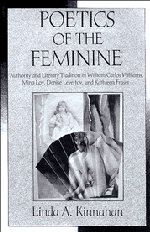 Poetics of the Feminine
Poetics of the Feminine Book contents
- Frontmatter
- Contents
- Acknowledgments
- Introduction
- 1 “The Full of My Freed Voice”: Williams and Loy, Feminism and the Feminine
- 2 In The American Grain: Proclaiming a Feminine Ground
- 3 Denise Levertov: The Daughter's Voice
- 4 Kathleen Fraser: A Tradition of Marginality
- Conclusion: Paterson and the Question of Authority
- Notes
- Bibliography
- Index
- CAMBRIDGE STUDIES IN AMERICAN LITERATURE AND CULTURE
2 - In The American Grain: Proclaiming a Feminine Ground
Published online by Cambridge University Press: 08 January 2010
- Frontmatter
- Contents
- Acknowledgments
- Introduction
- 1 “The Full of My Freed Voice”: Williams and Loy, Feminism and the Feminine
- 2 In The American Grain: Proclaiming a Feminine Ground
- 3 Denise Levertov: The Daughter's Voice
- 4 Kathleen Fraser: A Tradition of Marginality
- Conclusion: Paterson and the Question of Authority
- Notes
- Bibliography
- Index
- CAMBRIDGE STUDIES IN AMERICAN LITERATURE AND CULTURE
Summary
By 1923, Williams had written much of his American history, In the American Grain. Though the essays go only as far as Lincoln's assassination (Williams originally planned a second volume to complete the history), the entire text implicitly addresses its own particular moment in a rapidly changing America. Within the five years preceding 1923, the country had fought in a devastating war and had granted women, after decades of suffrage, the vote; only twenty-seven years before its entry into World War I, the federal government had waged its final battle with the Native Americans at Wounded Knee, and, as the book went to press in 1925, Indians had just received citizenship in the country they had inhabited for centuries.
These events stand as moments inextricably involved in and evolving from the history of America Williams chooses to tell. As a historical narrative that both searches for and critiques the cultural inheritance of a modern American ethos, In the American Grain refuses a historical objectivity by foregrounding the bias of race, nationality, and gender in the process of producing history. History, in this text, is not claimed as a form of scientific truth but is revealed as a constructed narrative, ideologically invested.
- Type
- Chapter
- Information
- Poetics of the FeminineAuthority and Literary Tradition in William Carlos Williams, Mina Loy, Denise Levertov, and Kathleen Fraser, pp. 75 - 124Publisher: Cambridge University PressPrint publication year: 1994
